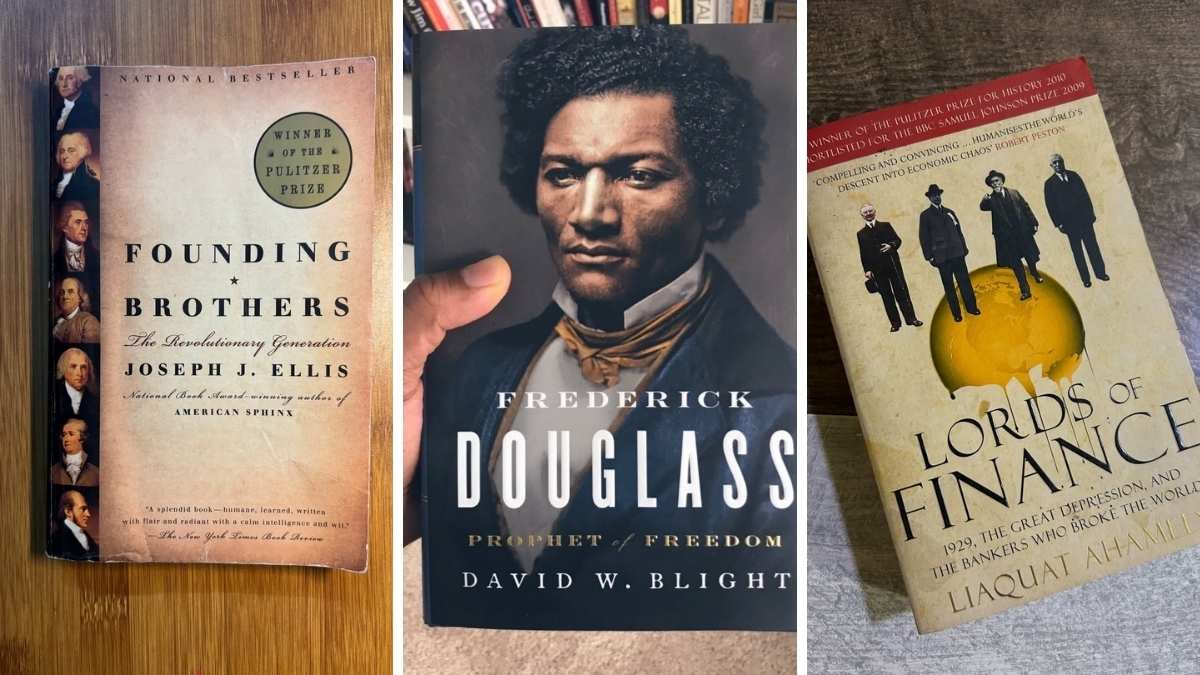
History is often painted in broad strokes, with iconic battles and well-known figures taking center stage. However, sometimes the most captivating stories come from the shadows of history—hidden within obscure documents, untold accounts, and forgotten characters.
The following Pulitzer Prize-winning books shed light on those captivating, often mysterious chapters of history, offering readers a thrilling ride similar to the best spy thrillers.
Let’s dive into the first five books, which not only capture the essence of historical moments but also read like heart-pounding espionage narratives.
1. The Gulf: The Making of an American Sea by Jack E. Davis

Pulitzer-winning Jack E. Davis takes a deep dive into the environmental history of the Gulf of Mexico, exploring how this natural resource shaped the American South’s economic and political landscape. But don’t be fooled—this is no dry history book. As Davis unearths stories of industrial abuse, environmental degradation, and the lives affected by the Gulf’s rich yet exploited resources, it reads with the intensity of a corporate espionage thriller. From environmental activists to industry titans, the stakes in this tale are high, and the story offers a behind-the-scenes look at power struggles, corporate greed, and the fight for survival in an ecological battleground.
What makes it thrilling? The hidden layers of manipulation and exploitation that have shaped the fate of a vital ecosystem make this book not just a history lesson but a gripping narrative. The real-life characters battling for control over the Gulf’s riches will keep you on edge.
2. “Sweet Taste of Liberty: A True Story of Slavery and Restitution in America” by Caleb McDaniel

At first glance, Henrietta Wood’s story might seem like another tragic account of slavery, but Caleb McDaniel unearths a deeper, far more thrilling story. In this compelling narrative, McDaniel chronicles Henrietta Wood’s remarkable journey as she sought justice after being kidnapped and sold back into slavery despite having been freed. The court battles, the twists and turns in the legal system, and the high-stakes confrontation with her former captors bring an unexpected legal drama element to this historical tale.
Why is it like a spy thriller? The book reads like a legal espionage saga—filled with hidden agendas, betrayals, and the pursuit of elusive justice. The intricacies of Wood’s case, with its twists and turns, unravel with the pacing of a courtroom drama. McDaniel not only highlights the personal struggle but also paints a broader picture of the legal system’s failings and its eventual triumph in a landmark case.
3. Cuba: An American History by Ada Ferrer

This sweeping history of Cuba, written by Ada Ferrer, doesn’t just cover political revolutions and famous historical figures; it also delves into the subtle power plays and covert interactions between the United States and Cuba, spanning 500 years of history. The tale is woven with personal stories, political intrigues, and the complex relationships that have defined Cuba’s place on the world stage. From the American embargo to the rise of Fidel Castro, Ferrer’s work offers a multi-dimensional view of the island that reads like a decades-long espionage thriller, filled with diplomatic maneuvering and secretive plots that have had long-lasting consequences.
What makes it captivating? The narrative follows covert battles for control, with both countries pulling the strings behind closed doors. With every chapter, Ferrer brings to light espionage and hidden diplomacy that would fit seamlessly into a Cold War-era spy thriller. Her storytelling captures the tension between two nations intertwined in a web of secrets and manipulation.
4. “The Internal Enemy: Slavery and War in Virginia, 1772–1832” by Alan Taylor

In this book, Alan Taylor uncovers the untold story of enslaved Black Virginians who fought against both the institution of slavery and the threat of war during the 18th and early 19th centuries. While many history books focus on well-known battles or figures, Taylor’s work is more like a cloak-and-dagger thriller. He highlights the hidden battles fought in Virginia by enslaved people, including those who sided with the British in exchange for freedom, offering a unique perspective on the Revolutionary War and the War of 1812.
What makes it thrilling? Covert operations amid war, with enslaved people working in secret to secure their freedom, will keep you hooked. Taylor masterfully brings to life the underground resistance movements and the quiet yet powerful acts of defiance that remain hidden in the historical record. It’s a story of espionage in the most personal form—freedom at any cost.
5. The Race Beat: The Press, the Civil Rights Struggle, and the Awakening of a Nation by Gene Roberts & Hank Klibanoff

The Civil Rights Movement is often told through the stories of its leaders, but Gene Roberts and Hank Klibanoff take a unique approach in this Pulitzer Prize-winning book, focusing on the role of the media in shaping the struggle for civil rights. This book explores the backstage drama of how newsrooms operated under intense pressure, highlighting the journalists who, often at great personal risk, exposed the deep-seated racism and inequality in the American South. This isn’t just a book about history—it’s an investigative thriller about a media war that helped reshape the nation.
Why is it a spy thriller? Think of it as spycraft in newsrooms, with journalists on the front lines of history, often walking a fine line between objectivity and activism. With each new investigation into the lives of Black Americans under segregation, these reporters risked their careers, their safety, and sometimes their lives. Their secretive methods and undercover work to expose the truth are akin to the tension-filled plots of espionage stories.
6. “An Army at Dawn: The War in North Africa, 1942-1943” by Rick Atkinson

Rick Atkinson’s An Army at Dawn” delves into the Allied campaign in North Africa during World War II. While much of history focuses on the climactic battles of Europe, Atkinson brings to light the often-overlooked pivotal moments that shaped the future of the war. Through a blend of military history and personal narratives, the book feels like a high-stakes military thriller, where every decision could alter the outcome of the war.
What makes it thrilling? The Allied commanders’ strategic calculations, under intense pressure, are portrayed with the suspense of military espionage. The tension between incompetence, surprise victories, and the ever-looming threat of Nazi forces keeps the reader on the edge of their seat, much like the unfolding chaos of a secret military operation.
7. Frederick Douglass: Prophet of Freedom by David Blight

In David Blight’s biography of Frederick Douglass, readers are treated to the life of one of America’s most complex and dynamic figures. Douglass’s journey from enslaved person to abolitionist leader is a tale filled with personal espionage—his constant efforts to navigate a society determined to keep him silent. Blight explores Douglass’s intricate maneuvers to spread the message of freedom, all while concealing and transforming his own identity in the face of persecution.
Why is it a spy thriller? Douglass, a man with secret alliances and covert strategies, fought the institutions of power through intelligence and persuasion, much like a spy operating in enemy territory. His life was a constant game of cat and mouse, moving between public speeches, clandestine meetings, and the forging of secret paths toward liberty. The suspense of uncovering his past and the hidden dangers he faced adds layers of intrigue.
8. Blood in the Water: The Attica Prison Uprising of 1971 and Its Legacy by Heather Ann Thompson

Heather Ann Thompson’s “Blood in the Water” is a riveting account of the Attica Prison Uprising and its aftermath, offering a detailed and eye-opening exploration of the events that led to one of the deadliest prison riots in U.S. history. The book reads like a thriller, filled with secret negotiations, high-level cover-ups, and the emotional rollercoaster of hostages and rebels caught in a violent standoff.
What makes it thrilling? The behind-the-scenes political maneuvers, the interrogations, and the highly secretive government response elevate this narrative from a mere historical account to a pulse-pounding thriller. The stakes are life and death, with both the prisoners and the authorities embroiled in a tense battle of wills—making this a dramatic story of betrayal and resistance.
9. “Embers of War: The Fall of an Empire and the Making of America’s Vietnam” by Fredrik Logevall

Fredrik Logevall’s “Embers of War” provides an in-depth analysis of how the United States became involved in Vietnam, highlighting the complex diplomatic chess game that took place behind closed doors. The book covers the downfall of the French colonial empire and the covert steps taken by American leaders that eventually led to full-scale involvement in Vietnam. It’s a tale of backdoor diplomacy and secret decisions, filled with competing agendas and hidden motivations.
Why is it like a spy thriller? The book reads like a high-level intelligence operation, where national leaders conduct covert negotiations with one another, unbeknownst to the public. The secrecy, the internal power struggles, and the miscalculations make this book feel like a geopolitical thriller. Every page unveils a new revelation about the shadowy world of diplomacy, where one wrong move could result in disastrous consequences.
10. Lords of Finance: The Bankers Who Broke the World by Liaquat Ahamed

Liaquat Ahamed’s “Lords of Finance” takes readers inside the world of the central bankers who played key roles in the lead-up to the Great Depression. By following the lives of four bankers, Ahamed crafts a tale of economic power plays, secrets, and betrayals—an account that feels just as thrilling as any spy novel. The decisions made in the secrecy of financial boardrooms, often with life-altering consequences, create a tension-filled narrative.
What makes it thrilling? The central bankers, each with their agenda and hidden strategies, operate like economic spies, manipulating currencies, policies, and even national economies behind closed doors. The stakes are high, with the entire world economy hanging in the balance—one wrong move could trigger an economic collapse. Ahamed’s investigation into these high-stakes maneuvers reads like a classic thriller, where financial power brokers play a dangerous game of hidden agendas and secretive influence.
11. “Malcolm X: A Life of Reinvention” by Manning Marable

Manning Marable’s biography of Malcolm X offers a deeper look at the civil rights icon’s life, stripped of the mythologized persona that has often overshadowed the complexities of his real story. Marable takes readers on a journey through Malcolm’s transformation, from his early days as Detroit Red to his later years as a global figure advocating for Black rights and justice. The narrative uncovers the covert tactics Malcolm employed, his underground alliances, and the constant reinvention of his identity in the face of adversity and political maneuvering.
Why is it like a spy thriller? Just like a master spy reinventing their identity, Malcolm X’s life was marked by secretive actions, shifting alliances, and covert political strategies. His constant self-reinvention—changing names, locations, and affiliations—echoes the high-stakes world of espionage, where every move could have life-altering consequences. Marable uncovers these hidden layers, revealing the untold stories of how Malcolm’s ideological shifts and alliances were not only strategic but also dangerous. The constant tension between public perception and private realities makes this book an electrifying read.
12. “Founding Brothers: The Revolutionary Generation” by Joseph Ellis

Joseph Ellis takes us deep into the lives of the founding fathers in “Founding Brothers”, focusing on six key figures—John Adams, Thomas Jefferson, Alexander Hamilton, Aaron Burr, Benjamin Franklin, and James Madison—who helped shape the new United States. This book is not just a recounting of famous events but a deep dive into the hidden rivalries, secretive negotiations, and ideological conflicts that nearly tore the fledgling nation apart. Ellis’ portrayal of the founding generation reveals the political maneuvering and backdoor dealings that often went on behind closed doors, much like a political espionage thriller.
What makes it thrilling? The book’s complex power plays between the nation’s early leaders, including secretive political tactics, fierce rivalries, and underground alliances, reads like a political thriller. The explosive moments—such as Hamilton’s secretive dealings with Jefferson, the deadly duel between Hamilton and Burr, and the intrigue surrounding the nation’s formation—are filled with clandestine moves that shaped the destiny of the United States. Each chapter uncovers hidden motivations and silent battles, making this book a thrilling account of the founding of America.







